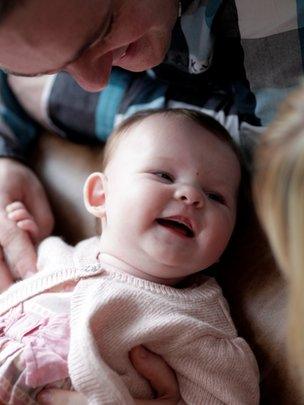'She went blue and shook from head to toe'
- Published

Scarlett spent five weeks in hospital after she was born because of the 'startle reflex'
Loud noises, unexpected movements or simply touching can be enough to trigger seizures in newborn babies with "startle disease".
Their chest and throat muscles freeze, their limbs go rigid and sometimes their breathing stops.
Comforting or cuddling these babies often makes it worse.
But new research has discovered a major cause of the disorder and a genetic test for startle disease, or hyperekplexia, is now a possibility.
For the 30 or 40 babies affected by the illness in the UK each year, this could transform their lives.
Scarlett Fifield, from Grimsby, was just three hours old when she was first startled.
"I'd felt abnormal movements and vibrations in my tummy during pregnancy, sometimes 10 times a day," says her mother, Abbie.
"Then when she was born she had her first seizure, went a bit blue and shook from head to toe. It was very frightening."
The attacks became steadily worse, occurring whenever Scarlett was fed, winded or startled in any way, until on one occasion she stopped breathing and doctors had to resuscitate her.
"Having a baby is meant to be the happiest time in your life, but we felt upset and really down. My hormones were all over the place."
Abbie couldn't breastfeed her daughter because Scarlett's mouth and nose were very sensitive and touching them would trigger convulsions.
It took five weeks before Scarlett could finally go home from hospital. By then she had been diagnosed with hyperekplexia and was taking medication to control the attacks.
Gene work
The only cause of the disease was thought to be mutations in the GLRA1 gene.
<link> <caption>However, recent research, led by University College London and funded by children's charity Action Medical Research</caption> <url href="http://www.jbc.org/content/early/2012/06/14/jbc.M112.372094.long" platform="highweb"/> </link> , has identified a second major cause of the disease - a mutation in the GlyT2 gene.
Dr Rhys Thomas, a clinical lecturer in neurology at Swansea University who helped carry out the research, says this discovery means families can get a definitive diagnosis.
The GlyT2 protein is important in understanding how 'startle reactions' work
"An early genetic diagnosis means babies can be monitored. It's important they survive the first few years of life.
"Hyperekplexia can be fatal and even though it's rare, we can be buying them 70 years of life."
Their research also means they can map out how the mutation will develop over time, and therefore how the disease will progress.
With the help of doctors and researchers from all over the world, Dr Thomas and his colleague, Professor Robert Harvey from UCL's School of Pharmacy in London, believe they can find more changes in genes that cause startle disease.
"We want to look at the unresolved cases and do genome sequencing to find out the causes in the remaining patients," says Prof Harvey.
"We want to try to resolve it in its entirety."
'Tense up'
Doctors rarely see a baby with hyperekplexia or they often misdiagnose it as epilepsy - and that is part of the reason some children go undiagnosed.
The disorder can have serious consequences, including sudden infant death, so early diagnosis and treatment is vital.
Now eight months old, Scarlett jumps and then laughs when she gets startled by a dog barking
The good news is that the disorder tends to resolve itself and by adulthood is much less of a problem, although some children can experience delays in developing speech or walking.
Some adults with the disorder, however, can find themselves dreading bonfire night, fearing slamming doors and other unexpected noises.
When babies are startled, triggering dangerous convulsions and stiffness, the nerve cells are being too easily excited because glycine receptors are impaired.
"They tense up in reaction to a sudden noise but there's no relaxation afterwards," explains Prof Harvey.
Abbie remembers how relieved she was to find how what was wrong with Scarlett.
"We thought we were going to lose her. We were relieved to know it wasn't such a bad thing, that Scarlett could live a normal life and that as they get older it gets better."
Eight-month-old Scarlett still occasionally has attacks, usually when she's asleep, her mother says.
"During the day she can make herself jump all the time but she just laughs now. A dog barking, a little tap on the back, if I walk into view... Anything like that can make it happen."
- Published16 July 2012